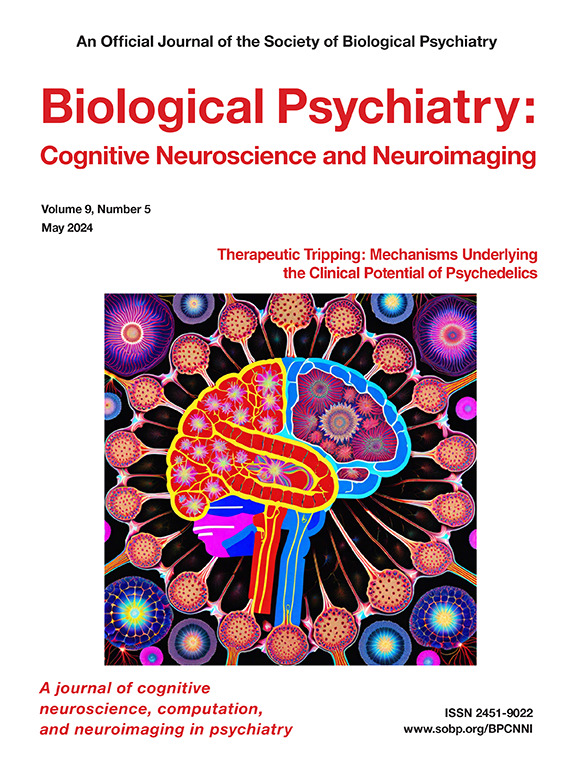Navigating Exploitative Traps: Unveiling the Uncontrollable Reward Seeking of Individuals With Internet Gaming Disorder
IF 5.7
2区 医学
Q1 NEUROSCIENCES
Biological Psychiatry-Cognitive Neuroscience and Neuroimaging
Pub Date : 2025-01-01
DOI:10.1016/j.bpsc.2024.05.005
引用次数: 0
Abstract
Background
Internet gaming disorder (IGD) involves an imbalance in the brain’s dual system, characterized by heightened reward seeking and diminished cognitive control, which lead to decision-making challenges. The exploration-exploitation strategy is key to decision making, but how IGD affects this process is unclear.
Methods
To investigate the impact of IGD on decision making, a modified version of the 2-armed bandit task was employed. Participants included 41 individuals with IGD and 44 healthy control individuals. The study assessed the strategies used by participants in the task, particularly focusing on the exploitation-exploration strategy. Additionally, functional magnetic resonance imaging was used to examine brain activation patterns during decision-making and estimation phases.
Results
The study found that individuals with IGD demonstrated greater reliance on exploitative strategies in decision making due to their elevated value-seeking tendencies and decreased cognitive control. Individuals with IGD also displayed heightened activation in the presupplementary motor area and the ventral striatum compared with the healthy control group in both decision-making and estimation phases. Meanwhile, the prefrontal cortex showed more inhibition in individuals with IGD than in the healthy control group during exploitative strategies. This inhibition decreased as cognitive control diminished.
Conclusions
The imbalance in the development of the dual system in individuals with IGD may lead to an overreliance on exploitative strategies. This imbalance, marked by increased reward seeking and reduced cognitive control, contributes to difficulties in decision making and value-related behavioral processes in individuals with IGD.
探索剥削陷阱:揭开网络游戏障碍者无法控制的奖励追求。
背景:网络游戏障碍(IGD)涉及大脑双系统的失衡,其特点是追求奖励的欲望增强,而认知控制能力减弱,从而导致决策难题。探索-开发策略是决策的关键,但 IGD 如何影响这一过程尚不清楚:为了研究 IGD 对决策的影响,我们采用了一种改进版的双臂强盗任务。参与者包括 41 名 IGD 患者和 44 名健康对照组 (HC) 患者。研究对参与者在任务中使用的策略进行了评估,尤其侧重于开发-探索策略。此外,研究还使用功能磁共振成像(fMRI)检查了决策和估计阶段的大脑激活模式:研究发现,IGD 患者在决策过程中更依赖于探索策略,这是因为他们的价值追求倾向增强,认知控制能力下降。与 HC 组相比,IGD 患者在决策和估计阶段的前辅助运动区(pre-SMA)和腹侧纹状体(VS)的激活程度也有所提高。同时,在利用策略阶段,IGD 患者的前额叶皮层(PFC)比 HC 组表现出更多的抑制。这种抑制作用会随着认知控制能力的减弱而减弱:研究得出结论,IGD 患者双系统发展的不平衡可能会导致他们过度依赖剥削策略。这种失衡的特点是追求回报的行为增多,而认知控制能力下降,从而导致 IGD 患者在决策和与价值相关的行为过程中遇到困难。
本文章由计算机程序翻译,如有差异,请以英文原文为准。
求助全文
约1分钟内获得全文
求助全文
来源期刊

Biological Psychiatry-Cognitive Neuroscience and Neuroimaging
Neuroscience-Biological Psychiatry
CiteScore
10.40
自引率
1.70%
发文量
247
审稿时长
30 days
期刊介绍:
Biological Psychiatry: Cognitive Neuroscience and Neuroimaging is an official journal of the Society for Biological Psychiatry, whose purpose is to promote excellence in scientific research and education in fields that investigate the nature, causes, mechanisms, and treatments of disorders of thought, emotion, or behavior. In accord with this mission, this peer-reviewed, rapid-publication, international journal focuses on studies using the tools and constructs of cognitive neuroscience, including the full range of non-invasive neuroimaging and human extra- and intracranial physiological recording methodologies. It publishes both basic and clinical studies, including those that incorporate genetic data, pharmacological challenges, and computational modeling approaches. The journal publishes novel results of original research which represent an important new lead or significant impact on the field. Reviews and commentaries that focus on topics of current research and interest are also encouraged.
 求助内容:
求助内容: 应助结果提醒方式:
应助结果提醒方式:


